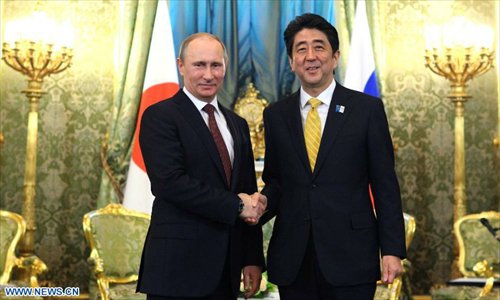Russia, Japan try to bridge gaps on thorny issues

Russia and Japan managed to move their positions closer on certain issues, pledging to speed up talks on reaching a peace treaty for the first time since the end of WWII, as leaders of the two countries met here on Monday.
Following his talks with visiting Japanese Prime Minister Shinzo Abe, Russian President Vladimir Putin told reporters that they have instructed the foreign ministers of both countries to " intensify contacts for devising a mutually-acceptable way of settling the problem" of the peace treaty.
Nevertheless, Putin ruled out the possibility of a quick settlement.
"We are to continue to work on that issue, complicated but important for both sides," the president said.
Abe also confirmed that Tokyo and Moscow have agreed to speed up their peace talks.
The lack of a peace treaty for nearly 68 years since the end of the Second World War is "abnormal," Abe noted, adding that " sufficiently great differences remain" between the two countries with regard to territorial issues.
"These talks should be conducted without haste," Abe said.
Tokyo and Moscow are in dispute over four small islands called the Southern Kurils in Russia and the Northern Territories in Japan, which has prevented the two countries from signing the peace treaty.
Abe said he has invited Putin to visit Japan in 2014. "I feel we have established trustful personal relations," he added.
Meanwhile, the two leaders shared some common grounds on the denuclearization of the Korean Peninsula and Iran's controversial nuclear program.
They condemned the Democratic People's Republic of Korea (DPRK) for its refusal to give up its nuclear weapons program, according to a joint statement issued after their talks.
The DPRK's recent moves have run counter to "the international community's calls," said the statement, adding that both leaders urged the DPRK to strictly comply with relevant resolutions of the UN Security Council.
Meanwhile, both countries welcome "further efforts" to create conditions for resuming the six-party talks in accordance with the principles and goals adopted in 2005, the statement added.
Putin and Abe also called on Iran to make efforts to restore international trust concerning its controversial nuclear program, and to meet the demands of the International Atomic Energy Agency to ensure the program is absolutely peaceful.
This was the fourth face-to-face meeting between Putin and Abe, the first Japanese prime minister to pay an official visit to Moscow in a decade.